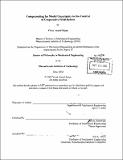Compensating for model uncertainty in the control of cooperative field robots
Author(s)
Sujan, Vivek Anand, 1972-
DownloadFull printable version (22.61Mb)
Other Contributors
Massachusetts Institute of Technology. Dept. of Mechanical Engineering.
Advisor
.
Terms of use
Metadata
Show full item recordAbstract
Current control and planning algorithms are largely unsuitable for mobile robots in unstructured field environment due to uncertainties in the environment, task, robot models and sensors. A key problem is that it is often difficult to directly measure key information required for the control of interacting cooperative mobile robots. The objective of this research is to develop algorithms that can compensate for these uncertainties and limitations. The proposed approach is to develop physics-based information gathering models that fuse available sensor data with predictive models that can be used in lieu of missing sensory information. First, the dynamic parameters of the physical models of mobile field robots may not be well known. A new information-based performance metric for on-line dynamic parameter identification of a multi-body system is presented. The metric is used in an algorithm to optimally regulate the external excitation required by the dynamic system identification process. Next, an algorithm based on iterative sensor planning and sensor redundancy is presented to enable field robots to efficiently build 3D models of their environment. The algorithm uses the measured scene information to find new camera poses based on information content. Next, an algorithm is presented to enable field robots to efficiently position their cameras with respect to the task/target. The algorithm uses the environment model, the task/target model, the measured scene information and camera models to find optimum camera poses for vision guided tasks. Finally, the above algorithms are combined to compensate for uncertainties in the environment, task, robot models and sensors. This is applied to a cooperative robot assembly task in an unstructured environment. (cont.) Simulations and experimental results are presented that demonstrate the effectiveness of the above algorithms on a cooperative robot test-bed.
Description
Thesis (Ph. D.)--Massachusetts Institute of Technology, Dept. of Mechanical Engineering, 2002. Includes bibliographical references (p. 113-123).
Date issued
2002Department
Massachusetts Institute of Technology. Department of Mechanical EngineeringPublisher
Massachusetts Institute of Technology
Keywords
Mechanical Engineering.